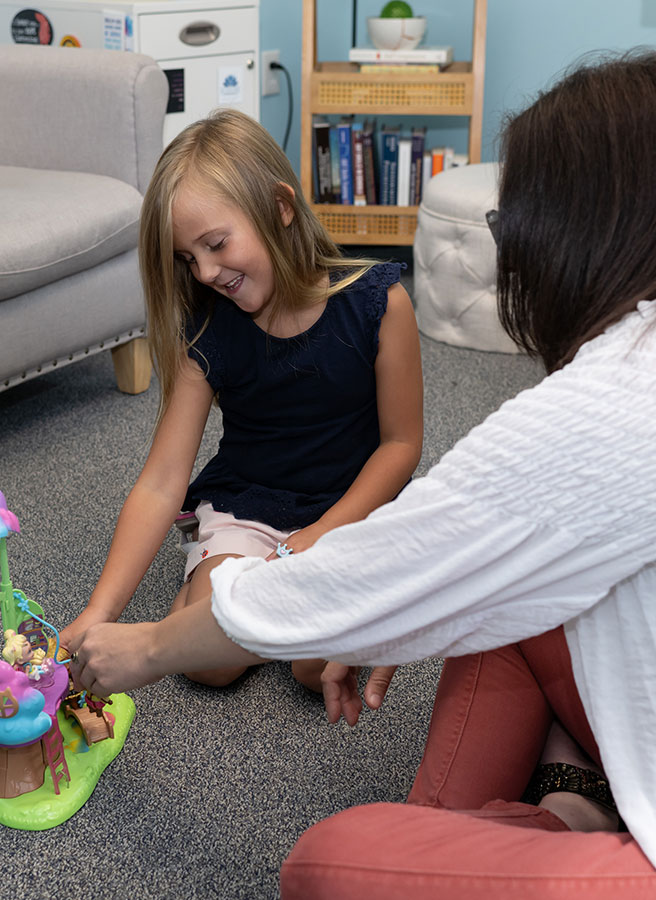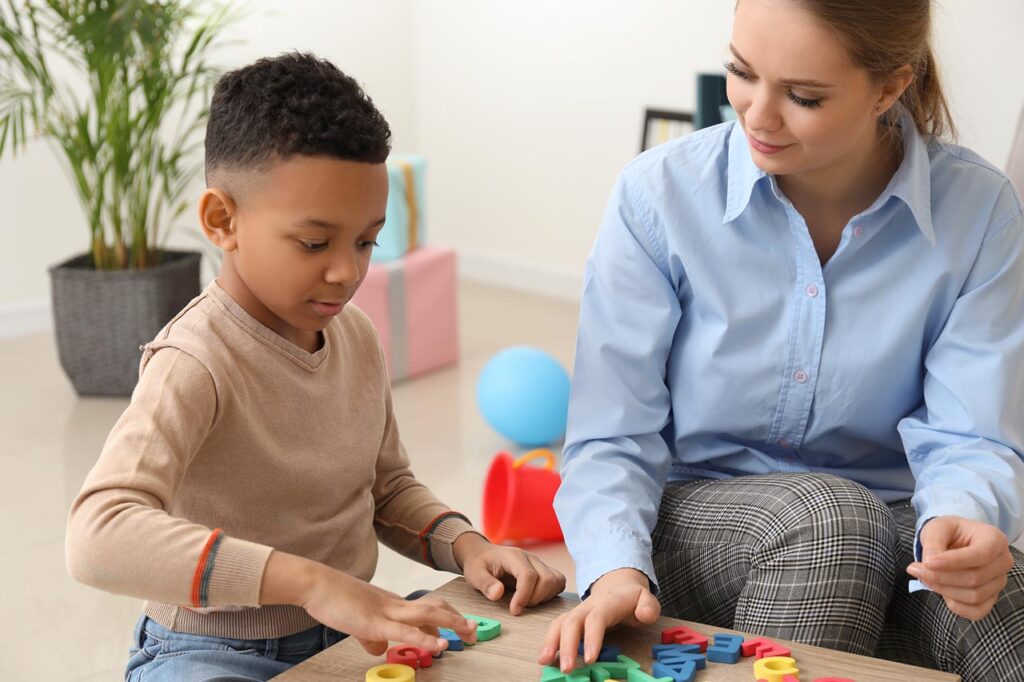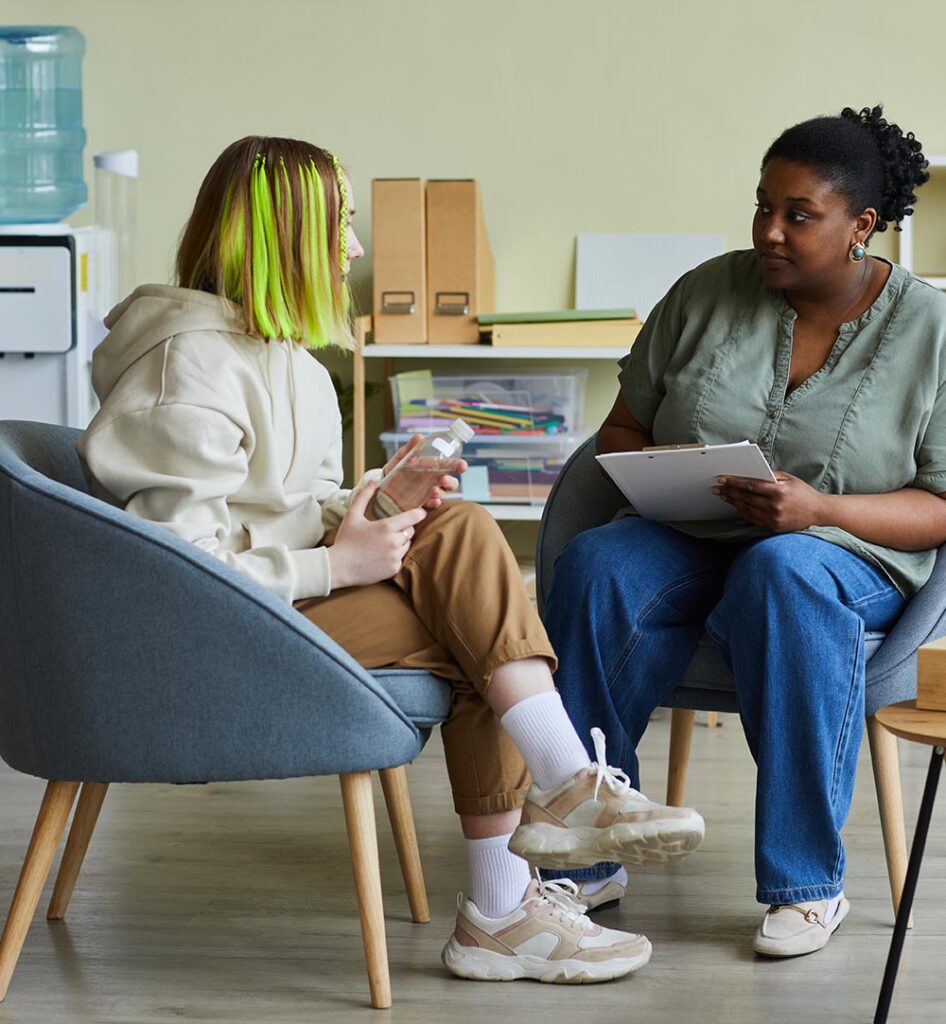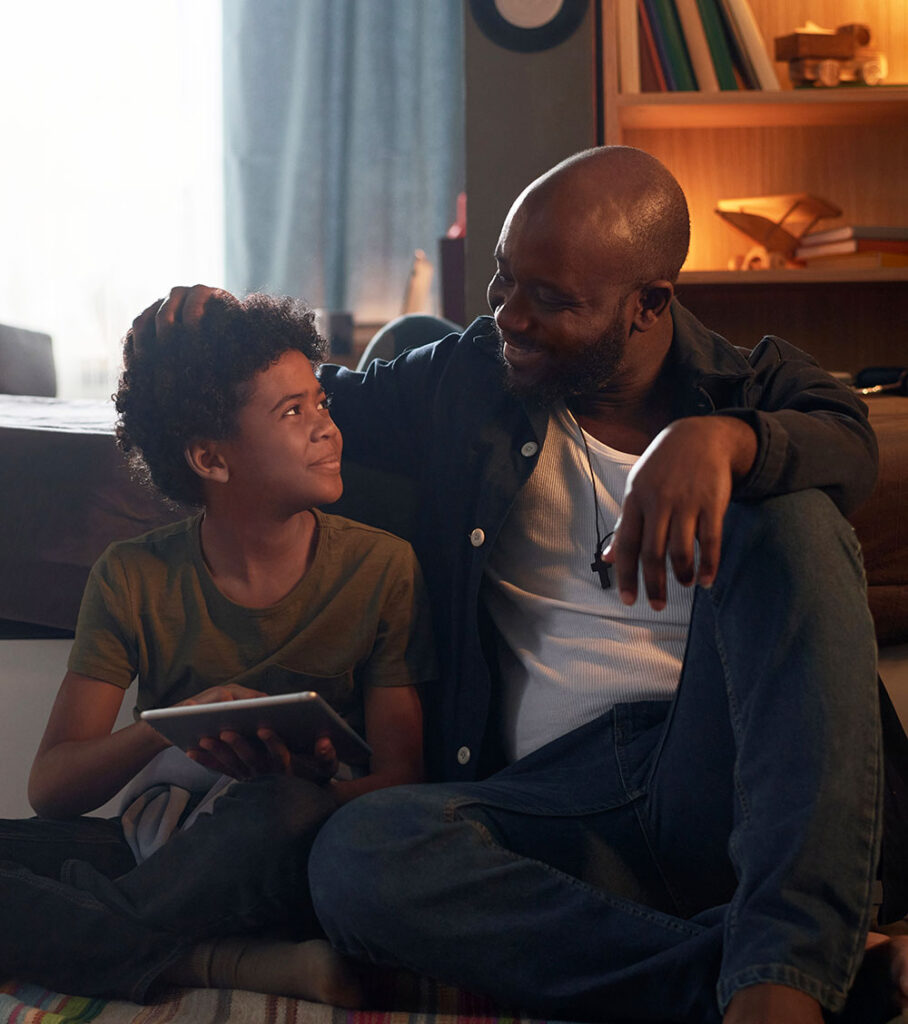Therapy For Children & Teens
Watching your child struggle is heartbreaking and confusing. What’s ‘normal’ at one age may look like a red flag at another. Emotion regulation issues can show up differently in a 6-year-old than a teen, and knowing when to seek help isn’t always obvious.
Why Work With Us?
Many of us are parents ourselves, and several of our team members are dedicated to helping children, teens and their parents feel empowered as they build emotional resilience and thrive. Our team’s compassionate support will have you feeling at ease as positive change begins. It is our absolute privilege to be a mental health support to the youth and families of South Jersey, and we love the work we do. We value clinical excellence, and are one of only two Linehan Board Certified DBT Programs in the State of New Jersey. We offer unique programming for children and parents in our Supersensers Programming, which you can learn more about below.

When To Start Your Child or Teen In Counseling:
Early intervention is vital for children and teens experiencing emotional difficulties. Seeking professional DBT counseling during their formative years can lay a foundation for a happier and healthier future. Our skilled child and teen therapists are skilled in engaging with young individuals, creating a positive therapeutic alliance that fosters growth and healing. Did you know that the skills-based teachings of DBT can be tailored to support emotion regulation at almost any age? This helps ensure that the skills are truly reinforced through every angle of life for both you and your loved one.
8 Benefits of DBT and Counseling for Children and Teens:
- Emotion Regulation Skills
Children and teens learn practical tools to understand, manage, and express their big emotions in healthier, more effective ways. - Mindfulness and Self-Awareness
Mindfulness practices support present-moment focus, increase self-awareness, and reduce impulsivity and reactivity. - Distress Tolerance Strategies
Kids develop coping mechanisms to manage intense emotions and crises without acting impulsively or engaging in harmful behaviors. - Improved Interpersonal Skills
Through DBT, young individuals learn skills to help facilitate better communication with parents, peers, and overall feelings and needs expression. - Stress and Anxiety Management
Children gain life-long tools to navigate stress and anxiety both at school and at home, with guidance and support from trained therapists. - Increased Resilience
DBT helps children bounce back from setbacks, fostering emotional strength, flexibility, and problem-solving skills. - Parent Skills Training and Support
Caregivers participate in skills training to better understand and respond to their child’s emotional needs with compassion and confidence. - Therapeutic Support from Skilled Clinicians
Children work with empathetic, highly trained therapists who specialize in treating emotion dysregulation and behavioral challenges across various settings.

Therapy for Children (Ages 6-12)
Life-stressors and other emotional or developmental challenges may present themselves differently in children than they would for adults and even teens. Your child might express themselves through their behavioral reactions rather than their words, which might make it difficult or challenging for you as a parent to know what they need, or what they are going through. We help children to understand and express their emotions, in addition to teaching them effective DBT skills and strategies to help them to cope effectively and more independently.
Skills For Supersensers
Raising a happy, healthy, thriving child is no small feat, and it gets even harder when your child experiences big emotions. Parenting doesn’t come with a handbook, especially when it comes to navigating emotion dysregulation. In DBT, we call these kids “supersensers”—deeply feeling, perceptive, and often overwhelmed. While their emotions can be intense, they can also be a superpower. Our goal is to help you understand and support your child in ways that bring more clarity, connection, and confidence to your parenting journey.
Is This Program Right for Your Child?
Your child might be a “Supersenser” if they:
💚 Have frequent meltdowns, explosive tantrums, or break things when upset
💚 Struggle with impulse control, hitting, or yelling
💚 Are described as intense or “too much” by adults
💚 Have a hard time making or keeping friends
💚 Constantly clash with parents or get in trouble at school
💚 Seem anxious, moody, or overwhelmed—even when no one else sees it
What Makes This Program Different
Unlike traditional therapy where kids go in alone and parents wait outside, this program is designed for the whole system—parent and child. You and your child each have your own dedicated therapist, working on the same DBT-based skills at the same time.
- ✅ Your child learns how to regulate big emotions
- ✅ You learn how to support them with calm, confidence, and consistency
- ✅ Everyone learns the same language—which means fewer meltdowns, more connection, and faster progress
It’s like becoming your child’s emotional coach—with expert backup every step of the way
What to expect
For Your Child (Ages 6–12)
💚 Weekly 50–60 min sessions with a child therapist
💚 Developmentally appropriate DBT curriculum
💚 Emotion regulation and frustration tolerance skills
💚 Mindfulness, coping, and self-awareness practice
💚 Social skills and friendship-building strategies
💚 Creative, fun, and engaging activities throughout
For You (The Parent/Caregiver)
💙 Weekly 50–60 min parent-focused sessions
💙 Learn the exact DBT skills your child is learning
💙 Emotion coaching and validation strategies
💙 Tools to manage meltdowns without escalating
💙 Consistent, compassionate discipline methods
💙 Separate parent-only sessions for deep support
results our families see
Your Child
💚 They’ll have tools to calm down instead of melting down
💚 Outbursts, hitting, or breaking things happen less often
💚 They’ll feel more understood—and get along better with others
💚 They’ll learn to name what they feel instead of acting it out
You-The Caregiver
💙 You’ll stop second-guessing yourself and feel more confident
💙 You’ll have a plan for what to do during tough moments
💙 You won’t feel like you’re walking on eggshells every day
💙 You’ll start to feel closer to your child again
Therapy for Teens (Ages 13-18)
Teenagers face unique pressures and challenges that range from academics, peer relationships, social connections, and navigating who they are as an individual. This age group may experience feelings of stress, anxiety, and confusion as they embark on several new obstacles. Our services can help provide a safe space for teens as they navigate through this important developmental time period by helping them to address their symptoms, build self-confidence, and improve their social relationships. In addition to therapy and skills training, we also provide groups for teens which allows them to feel validated and heard by not only their therapist, but by their peers and loved ones. Therapy for teens can have a positive impact on their mental health and developmental growth.

Understanding Your Teen's Behavior: What’s “Normal” and What’s a Concern?
As a parent, it’s natural to wonder if your teen’s behavior is “normal” or if it signals something more concerning. Trying to figure out whether their mood swings, withdrawal, or risk-taking is just part of growing up—or a sign they may be struggling—can feel confusing and overwhelming. It’s important to remember that teens are going through major developmental, social, and emotional changes as they navigate their path toward adulthood.
A helpful rule of thumb is to focus on intensity, duration, and the impact on daily functioning when assessing your teen’s behavior. Even if a behavior seems common for teens, it doesn’t necessarily mean it should be ignored or accepted. Behaviors that cause significant distress or disrupt daily life are worth paying attention to, even if they appear “typical” for their age group.
In DBT (Dialectical Behavior Therapy), we encourage parents to approach their teen’s behavior with curiosity, not judgment. Instead of jumping to conclusions or making assumptions, focus on open communication. This means asking gentle questions to better understand what your teen is experiencing, rather than labeling behaviors as simply “good” or “bad” or assuming it’s just a phase.
By shifting from assumptions to curiosity, parents can move away from rigid views of what’s “normal” and create space for meaningful conversations with their teens. These conversations can help uncover whether certain behaviors are causing emotional distress or interfering with their well-being.
Here are some examples of typical teen behaviors versus behaviors that may need further discussion:
Typical Teen Behaviors
- Prioritizing time with their peers over time with family
- Difficulty with their morning routine or getting to school on time
- Limit testing and risk taking
- Emotional sensitivity
- Worrying about their physical appearance to fit in
Behaviors of Concern to Discuss
- Not wanting to spend time with anyone, or an increase in isolation
- Reluctance to go to school or skipping school
- Engaging in high risk behaviors such as substance use, self harm and promiscuity
- Difficulty managing emotions or having disproportionate reactions
- Sudden changes in behaviors such as changes in appetite or over-exercising
Additional informational resources:
As a parent or caregiver, we naturally want what’s best for our children, especially their mental health and well-being. Mental health challenges are common amongst children and teens, but sometimes it’s hard to identify when they are struggling, or when to reach out for help. Here are some helpful signs and tips to look for if you think your child might benefit from therapy:
- Your child is dealing with a stressful situation in life (bullying, a health problem, a problem with a friend or loved one, school, or adapting to a new city/environment).
- Sudden or severe changes in behavior. If you notice your child or teen showing sudden or severe changes in behavior such as signs of increased anger, irritability, or isolation/withdrawal, it might be beneficial for them to talk to a mental health professional.
- They have trouble coping on their own. Most children and teens face a lot of stress or challenges with school, friends, or at home. If you notice that your child or teen begins to feel more overwhelmed or unable to cope on their own, they could benefit from learning valuable skills and strategies or by talking things out with a professional.
- If you notice that your child or teen’s sleeping and/or eating habits are off. Significant changes can be indicative that your child is struggling in some way, and they might benefit from talking to a professional or learning effective coping skills and strategies.
Early intervention is vital for children and teens experiencing emotional difficulties. Seeking professional DBT counseling during their formative years can lay a foundation for a happier and healthier future. If you notice changes in your child or teens behavior such as their ability to cope or express their feelings, difficulty connecting with others, an increase in isolation or withdrawing, or changes in your child or teen’s self-esteem, sleeping or eating patterns, it would be beneficial to take early action. Early intervention helps to prevent things from escalating and will help to get your child or teen back on the right track.
It’s important that their therapist is skilled in engaging with young individuals who also creates a positive therapeutic alliance that fosters growth and healing. At DBT of South Jersey we have several trained clinicians who are able to provide that space for your child or teen.
Child therapy at DBT of South Jersey is designed to help children manage intense emotions, improve social relationships, and learn and develop skills that will help them to cope with distressing situations. Our team has a select group of child and adolescent specialists who offer counseling for children in our Voorhees and Moorestown offices in South Jersey.
Children receive individual therapy that incorporates emotion regulation, problem solving, validation, and the importance of dialectical thinking – which balances acceptance and change all while teaching children that it’s okay to feel the way that they feel, but that we can also work on changing behaviors and patterns that aren’t helpful to us.
Children also learn DBT-skills and practice them in-session and as homework to help build mastery and independence.
- DBT skills include:
- Mindfulness – learn to pay attention to what you are feeling, thinking and doing
- Distress Tolerance – learn to cope with problems without making them worse
- Emotion Regulation – learn to change your emotions
- Interpersonal Effectiveness – learn how to get what you want and how to get along with others
DBT Therapy for Children (DBT-C) helps your child to recognize and understand emotions, better control their behaviors and thoughts, learn ways to effectively cope with and how to solve problems or life challenges.
DBT-C works by first instructing parents how to create a validating and change-ready environment. We then work to prepare parents to become coaches for their child so that it will help promote a supportive and validating environment. The ultimate goal of DBT-C is to teach parents and their children effective coping and problem-solving skills to help decrease vulnerabilities and distress, and to promote emotional independence and communication.
Parents and their child will participate in:
- Individual Therapy
- The opportunity for children to talk about their problems, learn about their emotions, and how to become a better problem solver and control their thoughts and behaviors.
- Parent Training
- DBT-C helps parents support their child’s progress all while helping parents manage their own emotions.
Learn more about DBT-C here: Child DBT | What is Dialectical Behavior for Children DBT-C?
We understand that as a parent, it can be incredibly difficult and challenging to see your child facing anxiety. You and your child might be feeling overwhelmed, but it’s important that children who have anxiety feel supported, validated, and safe. Anxiety can feel scary at times, which is why having a therapist that helps their client get to the root of what’s causing their problem is crucial.
Finding a therapist that takes a mindfulness approach could be what’s best for your child if they are dealing with anxiety, and here’s why. Mindfulness helps teach children how to observe, describe, and label their emotions and feelings, without being judgmental towards their thoughts and behaviors. In addition, children learn the power of being able to take a step back and pause, because it allows them to be able to begin identifying what they need, and how they can rebound themselves and move forward more mindfully. Getting to the root of what’s causing their anxiety allows children to also learn how to plan ahead of those stressful situations, or identify what they might need to do if they are in a situation that brings them anxiety.
It’s important that children participate in therapy that teaches them how to approach their anxiety with curiosity and compassion because our emotions aren’t a bad thing. They communicate to us what we need, and by taking a mindful approach, we can observe and describe what we need in an emotionally regulated way.
It’s perfectly normal and extremely beneficial for a teen to go to therapy. This is an important time for your teen’s social and emotional development, and they are also going through a lot of changes and challenges such as relationships, academic pressure, and figuring out who they are. Therapy can provide a safe and supportive outlet for teens as they navigate through all of life’s changes. Therapy doesn’t only help them with their mental health, but also with their self-esteem, confidence, decision making, problem-solving, building and maintaining relationships with others, as well as preventative care.
Dialectical Behavior Therapy (DBT) is helpful for adolescents especially if they struggle with emotion regulation, changes in behaviors, relationship issues, and self-destructive behaviors.
DBT therapy helps adolescents to identify, label, and effectively manage their emotions, improve their communication and social skills, and learn effective coping strategies. In addition, DBT therapy helps to equip adolescents with the tools they need to not only understand themselves better, but to also build their confidence, manage their emotions, and improve their overall well-being as they approach adulthood.
Accelerated Resolution Therapy (ART) is a modality that can also help teens who have been struggling with stuck emotions, thoughts, sensations and behaviors. ART is an evidence based treatment for depression and can also help teens with high anxiety, perfectionism, phobias and school refusal. DBT of South Jersey has some of the only therapists in the area providing this transformative treatment, and our work with teens has already shown amazing results.
A child and adolescent therapist plays a vital role in helping kids and teens navigate their emotional worlds. They work to create a safe, supportive environment where young clients feel comfortable exploring their thoughts and feelings, all while focusing on their unique goals.
Therapists tailor their approach to fit each child’s needs, using different techniques based on their clinical training and the family’s goals. Often, this work involves building essential skills for emotional regulation, improving communication, and fostering healthier relationships.
Collaboration between the therapist, child, and family is key. By creating a strong support system that extends from therapy sessions into daily life at home, families can ensure long-term success for their child’s emotional and mental well-being.
Every parent wants the best for their child, especially when it comes to their overall well-being. Despite their age, it is important to take their behavior and expressions seriously. If you’re concerned that your child may be struggling with their mental health, there are specific signs and behaviors that could indicate they need professional support from a counselor.
Here are some signs to watch for:
- Sudden or extreme mood changes
- Withdrawal from social interactions or loss of interest in activities they once enjoyed
- Difficulty managing emotions or frequent emotional outbursts
- Physical complaints like stomachaches, headaches, or muscle tension without a clear medical cause
- Panic or anxiety attacks
- Thoughts of harming themselves or others
- Suicidal thoughts or comments
A mental health crisis could involve some or all of these behaviors. If you recognize any of these warning signs in your child, reaching out to a mental health professional will provide them with the support they need to navigate their emotions and improve their well-being. If you are fearing your child is in immediate risk of danger, you can seek help from your local emergency screening center. There are also additional resources available if your child or teen is experiencing a mental health crisis:
- Nami – NAMI | National Alliance on Mental Illness
- Call or text the 988 Lifeline
- Trans Lifeline-(877) 565-8860
- NJ Parents of children and teens in crisis can call Performcare at (877) 652-7624
Dialectical Behavior Therapy (DBT) is an evidenced-based treatment used for children and teens to help improve their self-confidence, emotion regulation, communication skills, and overall well-being. DBT and its skills and strategies can be modified to fit the needs of all ages beginning at the age of 6 through adulthood. For children and teens, involvement of their parents or guardians is essential to ensure success. Parents are encouraged to communicate and connect with their child’s therapist to ensure that everyone is on the same page, and that they all work together towards the child’s goals.
Neurodiverse Kids and Teens: Focusing on Needs Over Masking
At DBT of South Jersey, we understand that neurodiverse kids—especially Autistic and ADHD kiddos—have unique needs. That’s why our therapists provide affirming, supportive care that respects their differences and never encourages masking. DBT, especially when adapted, supports emotion regulation, impulsivity, and routine. It teaches practical skills to help kids understand and manage their emotions more effectively. Our team is trained in neurodiversity-affirming care, helping children feel seen and supported exactly as they are.
Supporting Your Child or Teen’s Success in Therapy: What You Can Do

Your child or teen’s success in therapy greatly depends on you, the parent or caregiver. Because relationships with our children are transactional, their behavior impacts us—and ours impacts them. That’s why co-regulation between parent and child is essential for meaningful progress.
Our team of teen therapy experts is here to help, offering child and teen counseling both online for New Jersey residents and in person at our Voorhees and Moorestown locations.
Give your child the support they deserve. Contact us to book a free consultation with our intake team and get started today.
Support Beyond Child + Teen Therapy
At DBT of South Jersey, we know that children and teens aren’t the only ones who need support. We also work with parents, caregivers, couples, and individuals navigating anxiety, OCD, trauma, identity, and more. Our team offers LGBTQIA-affirming care, holistic services like 1:1 Reiki, and practical DBT tools for a range of challenges. Want to learn more about the other ways we support families? Check out our blog or reach out to talk with our intake team.

